Intro
Discover how DTaP includes tetanus vaccine, protecting against diphtheria, pertussis, and tetanus infections, with Tdap boosters for adolescents and adults, ensuring immunity and preventing vaccine-preventable diseases.
The DTaP vaccine is a crucial component of childhood immunization schedules, protecting against three serious bacterial infections: diphtheria, tetanus, and pertussis. Understanding the importance of this vaccine and its role in preventing these diseases is essential for parents, caregivers, and healthcare professionals. The DTaP vaccine is administered in a series of doses, typically starting at two months of age, with subsequent doses given at four, six, and 15-18 months, followed by a booster dose at 4-6 years. This schedule is designed to provide optimal protection against these diseases, which can have severe consequences if left unchecked.
The inclusion of tetanus vaccine in the DTaP formulation is particularly significant, as tetanus is a serious and potentially life-threatening disease. Tetanus, also known as lockjaw, is caused by the bacterium Clostridium tetani, which is found in soil, dust, and the gastrointestinal tracts of animals. The bacteria produce spores that can survive in a dormant state for years, making them highly resistant to environmental stresses. When these spores enter the body, typically through a wound or cut, they can germinate and produce toxins that affect the nervous system, leading to muscle stiffness, spasms, and rigidity.
The tetanus component of the DTaP vaccine is designed to provide long-term protection against this disease, and it is essential for individuals of all ages to maintain up-to-date tetanus vaccination. This is particularly important for individuals who work with soil, animals, or in occupations that involve a high risk of injury, as these individuals are more likely to be exposed to tetanus spores. Furthermore, tetanus vaccination is also crucial for individuals who travel to areas where tetanus is common or where medical care may be limited.
Dtap Vaccine and Its Components
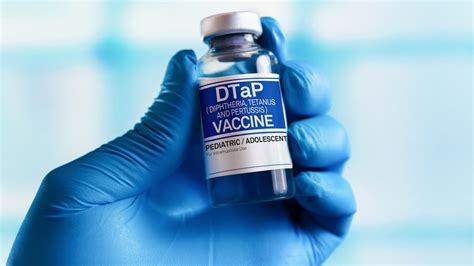
The DTaP vaccine is a combination vaccine, meaning it protects against multiple diseases in a single formulation. The vaccine contains inactivated toxins (toxoids) from the diphtheria and tetanus bacteria, as well as a pertussis component that includes several proteins from the pertussis bacteria. The pertussis component is designed to provide protection against the bacteria that cause whooping cough, a highly contagious respiratory disease that can be severe in infants and young children. The combination of these components in a single vaccine makes it easier to administer and reduces the number of injections required, making it more comfortable for children and adults alike.
Benefits of the DTaP Vaccine
The benefits of the DTaP vaccine are numerous and well-documented. By protecting against diphtheria, tetanus, and pertussis, the vaccine helps to prevent severe illnesses and reduce the risk of complications and long-term health problems. The vaccine is also highly effective, with studies showing that it provides more than 90% protection against these diseases. Additionally, the DTaP vaccine has been shown to be safe, with most side effects being mild and temporary, such as redness, swelling, or pain at the injection site.How the DTaP Vaccine Works
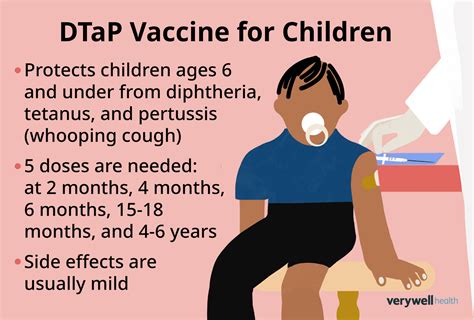
The DTaP vaccine works by stimulating the immune system to produce antibodies against the diphtheria, tetanus, and pertussis toxins. When the vaccine is administered, the immune system recognizes the toxoids and proteins as foreign and mounts an immune response, producing antibodies that can recognize and neutralize the toxins. This provides long-term protection against these diseases, as the immune system can quickly respond to any future exposures to the bacteria. The vaccine also helps to reduce the spread of these diseases in the community, as vaccinated individuals are less likely to become infected and transmit the bacteria to others.
DTaP Vaccine Schedule
The DTaP vaccine is typically administered in a series of doses, with the first dose given at two months of age. Subsequent doses are given at four, six, and 15-18 months, followed by a booster dose at 4-6 years. This schedule is designed to provide optimal protection against these diseases, with the booster dose helping to maintain immunity throughout childhood and into adolescence. It is essential to follow the recommended vaccine schedule to ensure that children receive the full benefits of the vaccine and are protected against these serious diseases.Side Effects and Risks
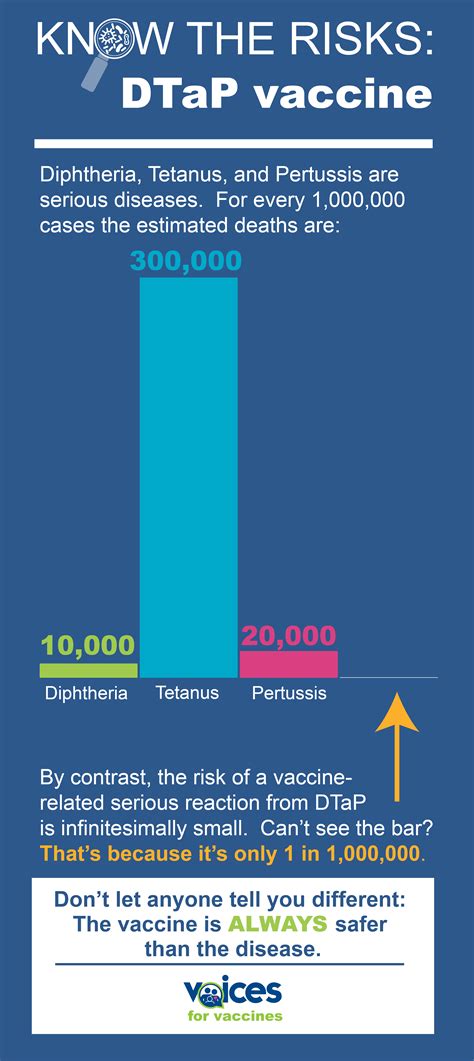
Like all vaccines, the DTaP vaccine can cause side effects, although these are typically mild and temporary. Common side effects include redness, swelling, or pain at the injection site, as well as fever, fussiness, or loss of appetite. In rare cases, more serious side effects can occur, such as allergic reactions or seizures. However, these side effects are extremely rare and are often associated with underlying medical conditions or other factors. It is essential to discuss any concerns or questions about the DTaP vaccine with a healthcare provider, who can provide personalized advice and guidance.
Contraindications and Precautions
There are certain contraindications and precautions to consider when administering the DTaP vaccine. For example, individuals with a history of severe allergic reactions to any component of the vaccine should not receive the vaccine. Additionally, individuals with certain medical conditions, such as neurological disorders or immune system problems, may need to take special precautions or receive alternative vaccines. It is essential to consult with a healthcare provider to determine the best course of action and to ensure that the vaccine is administered safely and effectively.Importance of Booster Shots
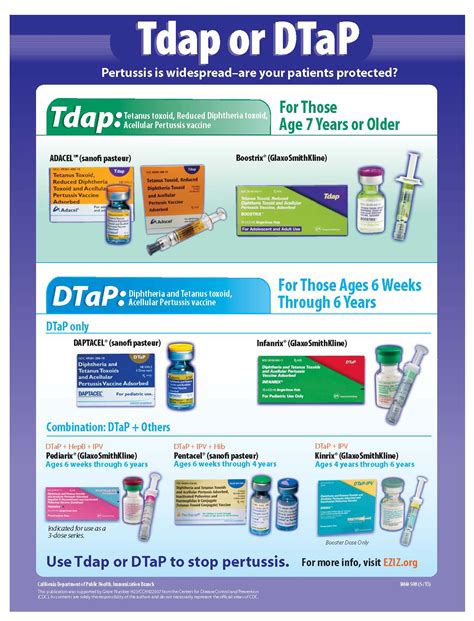
Booster shots are an essential component of the DTaP vaccine schedule, helping to maintain immunity throughout childhood and into adolescence. The booster dose, typically given at 4-6 years, helps to provide long-term protection against these diseases and reduces the risk of outbreaks in the community. Additionally, booster shots can help to protect against new strains of the bacteria that may emerge over time, providing ongoing protection against these serious diseases.
Adult DTaP Vaccination
Adults also need to receive DTaP vaccination, particularly if they have not received a booster dose in the past 10 years. This is especially important for individuals who work with children, are pregnant, or have certain medical conditions that increase their risk of infection. Adults can receive a Tdap vaccine, which is a combination vaccine that includes tetanus, diphtheria, and pertussis components. The Tdap vaccine is typically given as a single dose, although it may be given in combination with other vaccines, such as the influenza vaccine.DTaP Vaccine and Pregnancy
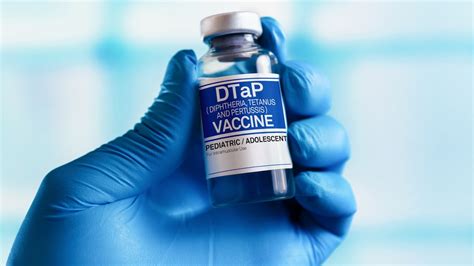
The DTaP vaccine is recommended for pregnant women, particularly during the third trimester. This helps to provide protection against pertussis, which can be severe in newborns. The vaccine is also recommended for women who are breastfeeding, as it can help to protect against pertussis and other diseases. Additionally, the DTaP vaccine can be given to pregnant women who have not received a booster dose in the past 10 years, providing ongoing protection against these serious diseases.
DTaP Vaccine and Travel
Individuals who travel to areas where diphtheria, tetanus, and pertussis are common may need to receive additional doses of the DTaP vaccine. This is particularly important for individuals who work with children, are pregnant, or have certain medical conditions that increase their risk of infection. It is essential to consult with a healthcare provider to determine the best course of action and to ensure that the vaccine is administered safely and effectively.What is the DTaP vaccine, and how does it work?
+The DTaP vaccine is a combination vaccine that protects against diphtheria, tetanus, and pertussis. It works by stimulating the immune system to produce antibodies against the toxins produced by these bacteria, providing long-term protection against these diseases.
Who should receive the DTaP vaccine, and what is the recommended schedule?
+The DTaP vaccine is recommended for children, adolescents, and adults. The typical schedule includes a series of doses given at 2, 4, 6, and 15-18 months, followed by a booster dose at 4-6 years. Adults may also need to receive a Tdap vaccine, particularly if they have not received a booster dose in the past 10 years.
What are the benefits and risks of the DTaP vaccine?
+The benefits of the DTaP vaccine include protection against diphtheria, tetanus, and pertussis, as well as reduced risk of complications and long-term health problems. The risks of the vaccine are typically mild and temporary, although rare serious side effects can occur. It is essential to discuss any concerns or questions with a healthcare provider.
Can adults receive the DTaP vaccine, and is it recommended during pregnancy?
+Yes, adults can receive the DTaP vaccine, particularly if they have not received a booster dose in the past 10 years. The vaccine is also recommended for pregnant women, particularly during the third trimester, to provide protection against pertussis and other diseases.
What are the contraindications and precautions for the DTaP vaccine?
+Contraindications and precautions for the DTaP vaccine include a history of severe allergic reactions to any component of the vaccine, certain medical conditions, and neurological disorders. It is essential to consult with a healthcare provider to determine the best course of action and to ensure that the vaccine is administered safely and effectively.
In summary, the DTaP vaccine is a crucial component of childhood immunization schedules, protecting against diphtheria, tetanus, and pertussis. The vaccine is safe, effective, and provides long-term protection against these serious diseases. It is essential to follow the recommended vaccine schedule and to consult with a healthcare provider to determine the best course of action. By understanding the importance of the DTaP vaccine and its role in preventing these diseases, we can work together to protect ourselves, our children, and our communities against these serious diseases. We invite you to share your thoughts, ask questions, or seek additional information about the DTaP vaccine and its importance in maintaining public health.
